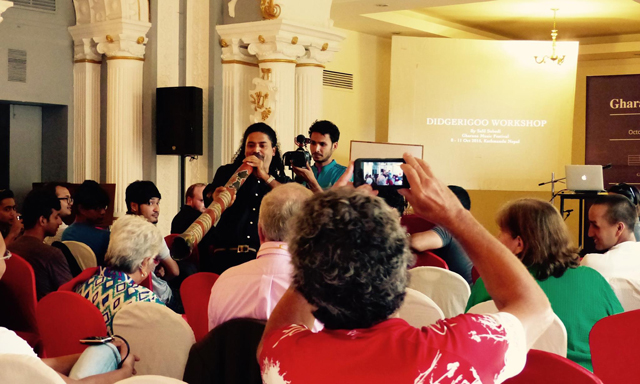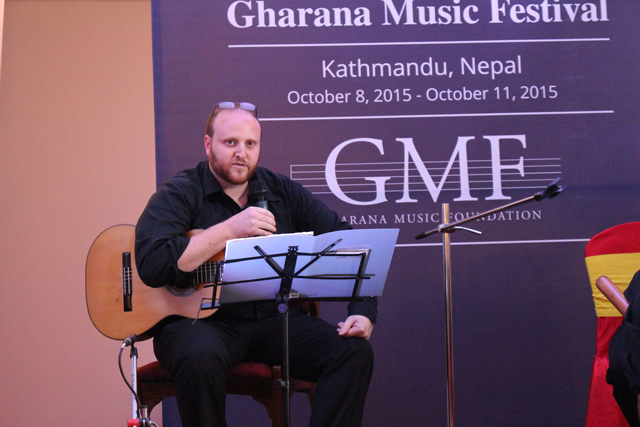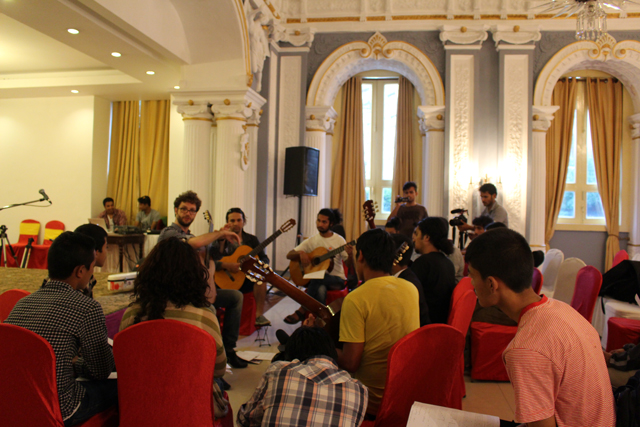A conversation with Daniel Linden, founder and president of Gharana Music Foundation.
 Gharana Music Foundation (GMF), in association with The City Museum, Qatar Airlines, and D’Addario Foundation, organized its first music festival this October (8-11) at Hotel Yak & Yeti. The organizers had invited American and Australian veteran classical musicians, mostly guitarists, namely, Anna Maria Rosado, Brendan Evans, Laura Metcalf (cello), Paul Cesarczyk, and Rupert Boyd. The event also featured local musicians Rabin Lal Shrestha (tabla) and Salil Subedi (didgeridoo).
Gharana Music Foundation (GMF), in association with The City Museum, Qatar Airlines, and D’Addario Foundation, organized its first music festival this October (8-11) at Hotel Yak & Yeti. The organizers had invited American and Australian veteran classical musicians, mostly guitarists, namely, Anna Maria Rosado, Brendan Evans, Laura Metcalf (cello), Paul Cesarczyk, and Rupert Boyd. The event also featured local musicians Rabin Lal Shrestha (tabla) and Salil Subedi (didgeridoo).
Here is what Daniel Linden, founder and president of GMF, had to say regarding the festival’s outcome:

How was the experience of hosting the first ever Gharana Music Festival? In what ways did it turn out to be rewarding?
Hosting our first festival was an incredible experience. To see our vision of promoting classical music and music education come to life was very exciting and rewarding, and the entire event was an enormous success. Pushing through challenges is also a part of organizing any event, both expected and unexpected. Our team handled everything extremely well, and we were able to present something that I think was quite unique and special for our audiences and workshop participants. Despite the current fuel crisis, among other great difficulties, which has obviously made transportation a challenge, our concerts were well attended, and students came in very good numbers to attend the educational workshops. I was also pleased that people were able to take advantage of the carpool bus we organized to pick up attendees and drop them off at several locations throughout the city.
It was very moving to see so many dedicated music students come out to learn from the participating artists, and this interest motivates us to continue to move forward with our educational goals, which is at the heart of the Gharana Music Foundation. Also, the concert performances were simply incredible, and I think every audience member walked out of the concert hall each night feeling that they had experienced something special.
Something else very important to note is that, music and the arts are flourishing in Kathmandu on a larger scale. This festival was one of the first of several major music and art festivals presented by various organizations in Kathmandu this autumn, all of which were extremely well organized, meaningful, and well attended. It is encouraging to see this, and to know what great results can truly be achieved when creativity, vision, imagination, dedication, and organization all come together.

How has it helped to propel the organization forward?
This first Gharana Music Festival set a precedent, and demonstrated that there is great potential to realize our goals of providing increased opportunities to experience live classical music from around the world, as well as increased educational opportunities to expand horizons for young musicians in Nepal. The turnout of students at our workshops, their intense focus while learning from great teachers, and their appreciation for the opportunity, clearly indicated that we are on the right track, and this encouragement propels us forward, as we are already developing concepts for future educational projects. The festival also put us on the map, both in Nepal and internationally, and this has generated interest, and will continue to generate interest, in what the Gharana Music Foundation is doing to promote music and music education in Nepal, helping us to achieve even greater goals as we move forward.
Will there be any other similar festivals in the future?
We plan to make the Gharana Music Festival an annual event, and to start developing additional projects and programs throughout the year as we grow as an organization.
What were the musicians’ reactions?
All the musicians had a truly great experience at the Gharana Music Festival, and the international artists thoroughly enjoyed visiting Nepal. A couple of them even had a good deal of time to explore Kathmandu and other parts of the country after the festival. Also, one of the great things about an international festival like this is that, musicians from different places get an opportunity to meet and connect with each other in a creative environment, both musically and personally. It was incredible to watch the conversations unfold and see deep connections made. It was an interesting mix of perspectives, too, with Nepali musicians meeting American and Australian musicians, but also, for example, a Polish American musician living in Thailand meeting and sharing perspectives with others from his home city, New York, for the first time right here in Kathmandu, and everyone learning something from everyone else’s conversations and experiences. This festival put Kathmandu on the map as a destination where classical musicians from Nepal and from around the world can share an artistic and intellectual space.
As professional musicians who tour the world performing and teaching, I know that all the artists felt that audiences and students received them with a great deal of warmth and appreciation here in Nepal. There is a certain feeling inside a concert hall when the artist and the audience are connecting with one another, and this connection was extremely evident on those four nights at Yak & Yeti. Perhaps even more important was the incredible connection the artists made with the students participating in their workshops, and it was truly a pleasure to witness this, and to have students walk out of each session asking when and where the next opportunity to continue learning will be.










